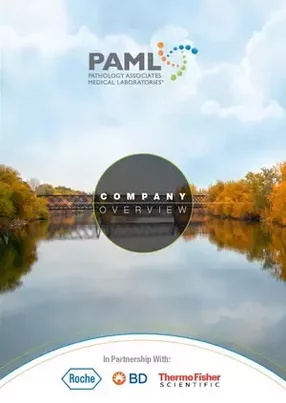Innovation is very important to medical reference laboratory PAML. So much so that it created a division dedicated to its pursuit. Dr Francisco R. Velázquez, President and CEO, says, “Their job is to go around the organization and look for opportunities to improve our quality, our service, and our costs, with the caveat that everything they do must have, at the end of the day, some financial impact.” They call this team the Performance Solutions Group.
The Washington company, which was founded in 1957, serves physicians, hospitals, members of the community, employers, and other allied health professionals. It is ranked among the top clinical reference laboratories in the country and is considered an industry leader in joint venture partnerships with community-based hospitals. Its laboratory outreach program partners with hospitals allowing them to significantly grow their laboratory outreach businesses.
PAML has eight joint ventures, each a freestanding LLC based on a community partnership model. Dr Velázquez and his team of executives lead each of these ventures, as well as the primary PAML brand and two PAML product lines.
With the responsibility of 11 entities, no two days look the same for Dr Velázquez. He says, “I do move around a lot and I like to go spend time in our various facilities and with our various partners.”
The company’s partners are varied and range from testing partnerships (such as a health system in Montana) to high-level, nationwide joint ventures.
These ventures have been developed andto develop, Dr says, “On the basis of ourthat healthcare is local and our goal should be to enhance the ability of local providers tothe broadest possible service level they can.” Partnerships have to be mutually beneficial and involve providing better services to the communities they are in, he adds, or they will find other avenues to do business.
PAML’s strategic partnerships include one with the molecular technology company, Axela, a spin-out of the of Torontothat we see as beneficial for our partners, so we partner with them develop assays that can be used in the American market,” says Dr Velázquez. Partnerships account for many advances, though PAML also prides itself on its ability to produce innovative resources in-house.
One of these resources is a new, progressive cost-accounting system. “We're going to see morepayments, more population health management, more regionallynetworks and morecare,” says Dr Velázquez. “So, the common dominator to all those is not revenue. The common denominator is that you must understand your cost structure, very, very, very, very well so you can make informed decisions as to which one of these market models you can participate in and what the advantages and disadvantages are, from a financial perspective.
In order to do that you have to have access to the ways your costs are changing throughout the day. “What most laboratory companies do is they react on a monthly or weekly or quarterly basis to what happened. To what already happened. We believe it’s more important to react while it's happening so we can correct it or change course,” says Dr Velázquez.
So, the business performance division at PAML has engineered a system that keeps track of metrics, on a real-time basis, “So we always know how we're doing, with pretty much anything, at any given time, with the appropriate report or report structure.”
PAML’s role in the economic development of the region, specifically in the area of life sciences, is something very important to the company. To that end, Dr Velázquez is in a number of leadership groups looking at medical education, healthcare, and healthcare-related technology. One of the projects he’s currently working on is the new medical school in the area. This, along with other projects, generates dialogue and development throughout the community and company.
Opening lines of communication is critical to Dr Velázquez and he makes a point of regularly spending time with the company’s clients, partners, and employees. “I tend to walk around whenever possible and just ask people how are they doing and what's going on and what can we be doing better or different,” he says, though he agrees this isn’t the norm in a lot of organizations.
“My theory, without any analytics behind it, is that employees have about 65 percent of the answers to all the questions we are asking, if we just take the time to ask.”
He meets his partners in their offices because, it’s “more productive to do it that way and it allows them to be in their own environment.” He also says he enjoys knocking on doors for a quick chat, as you can learn quite a lot about the person and the business, “as long as they are free to talk, that is.”
PAML spends a lot of time asking employees what they think could be improved. According to Dr Velázquez, “We're always looking at our operation with the question of how can we do better. Once we are 100 percent confident that it is replicable, then we'll go more public with it.”
He talks of a man who “started at PAML in logistics, a fireman paramedic by training. But he is someone who had this inquisitive mind and a very well-defined analytical skill. He helped us develop a superb logistical system. I was impressed with the fact he was very serious so we decided to let him loose and see what happened…He’s now the Chief Performance Improvement Officer,” leading the business performance division.
The general philosophy at PAML is that everyone has something to offer. Says Dr. Velázquez, “Sometimes little changes can have positive impacts.”

